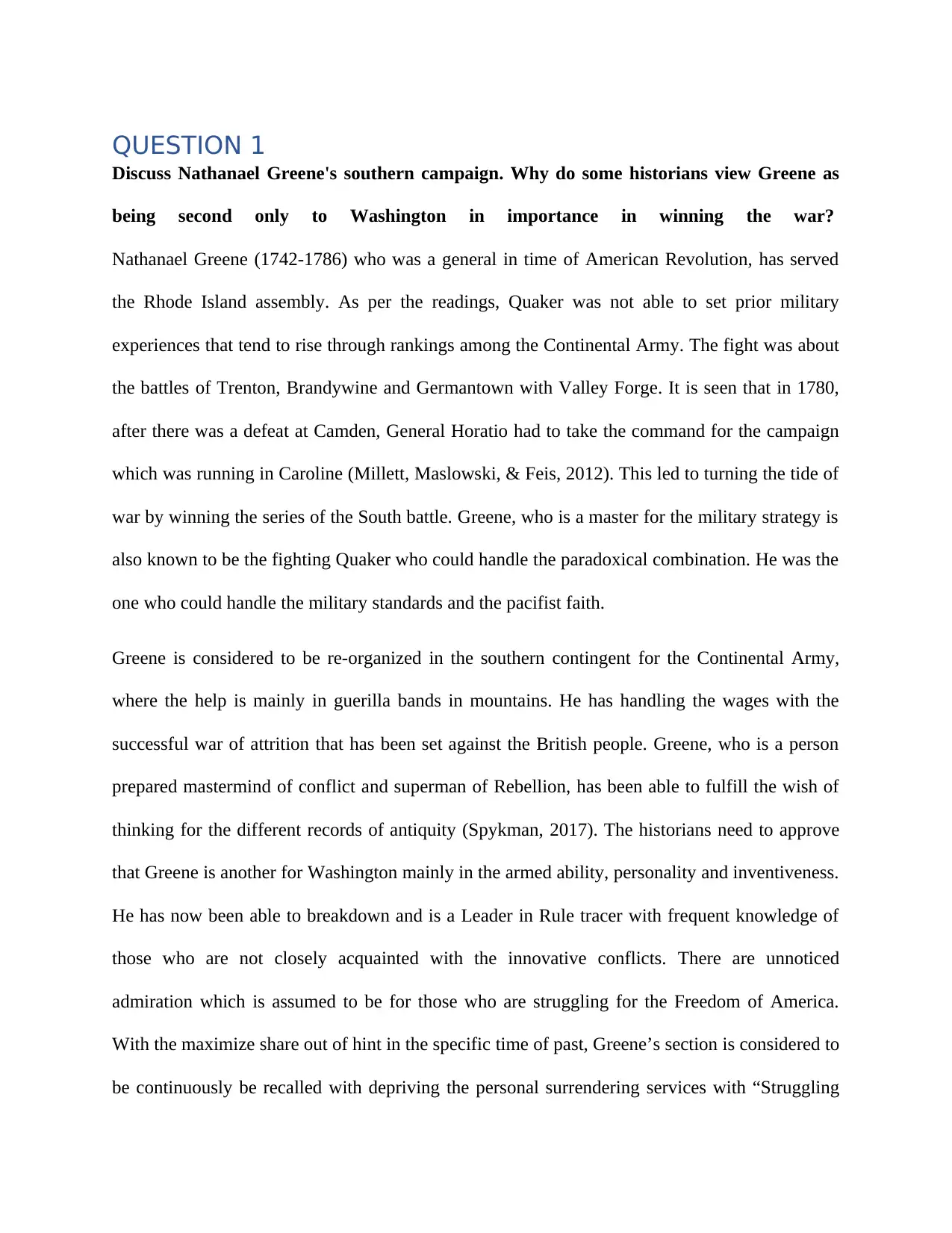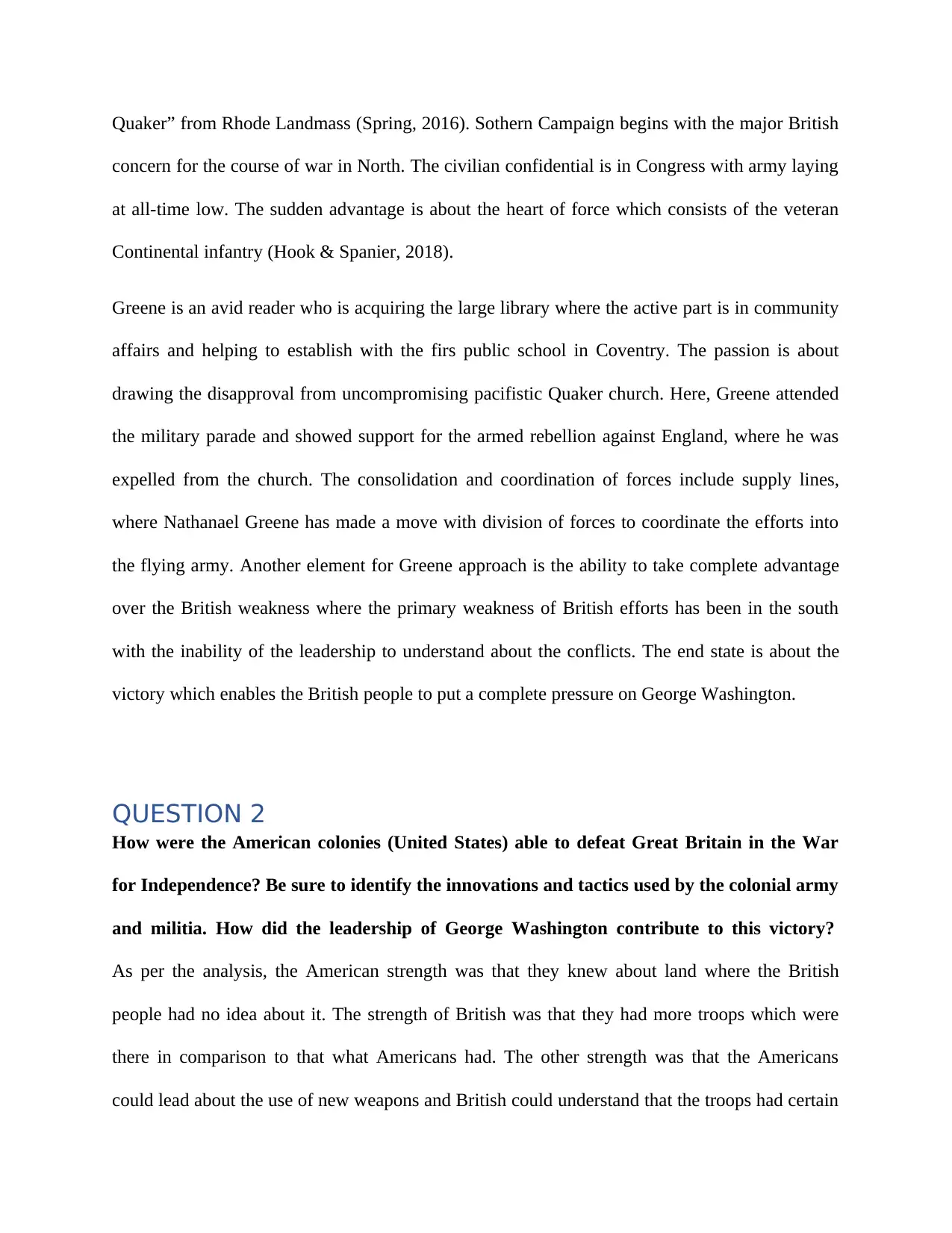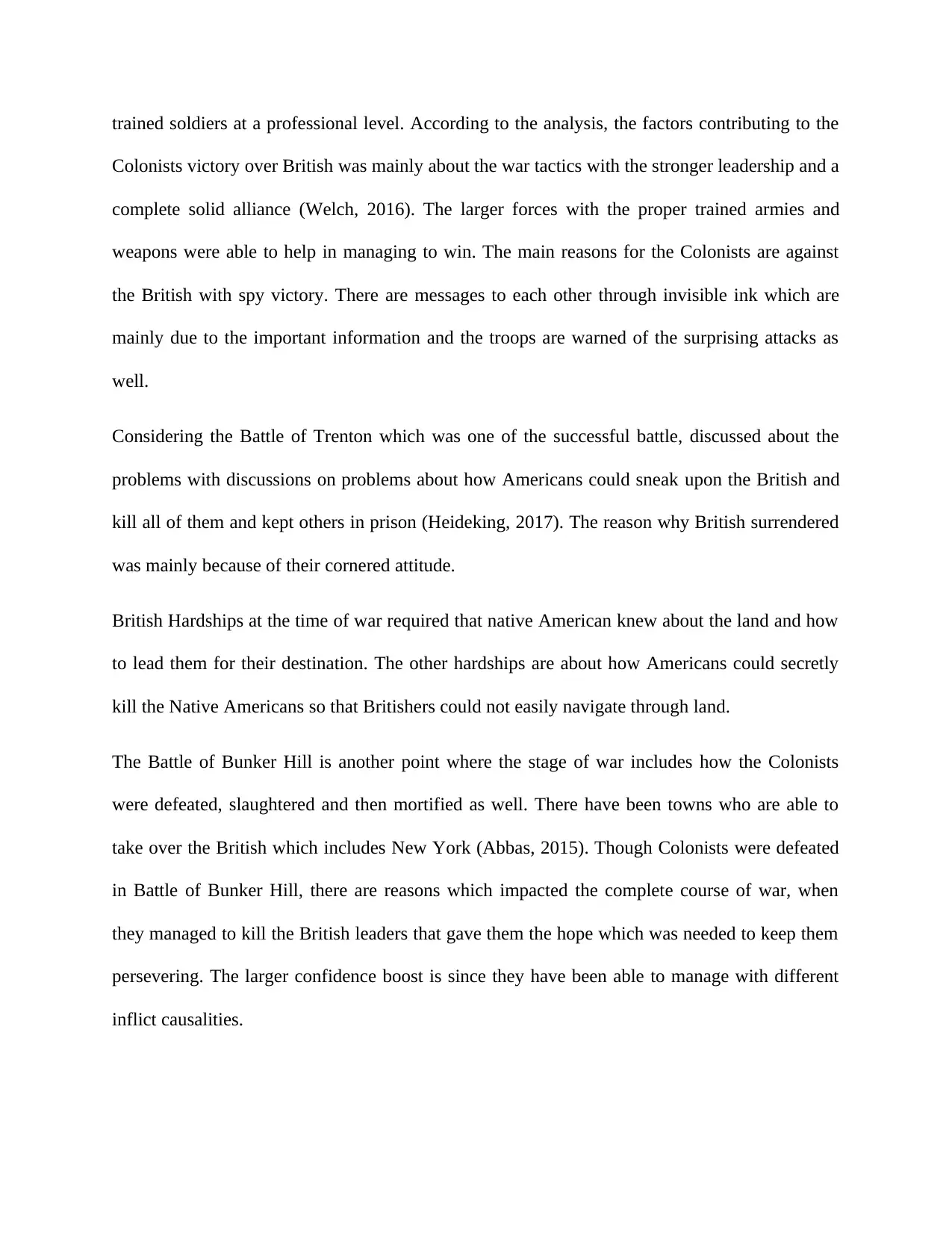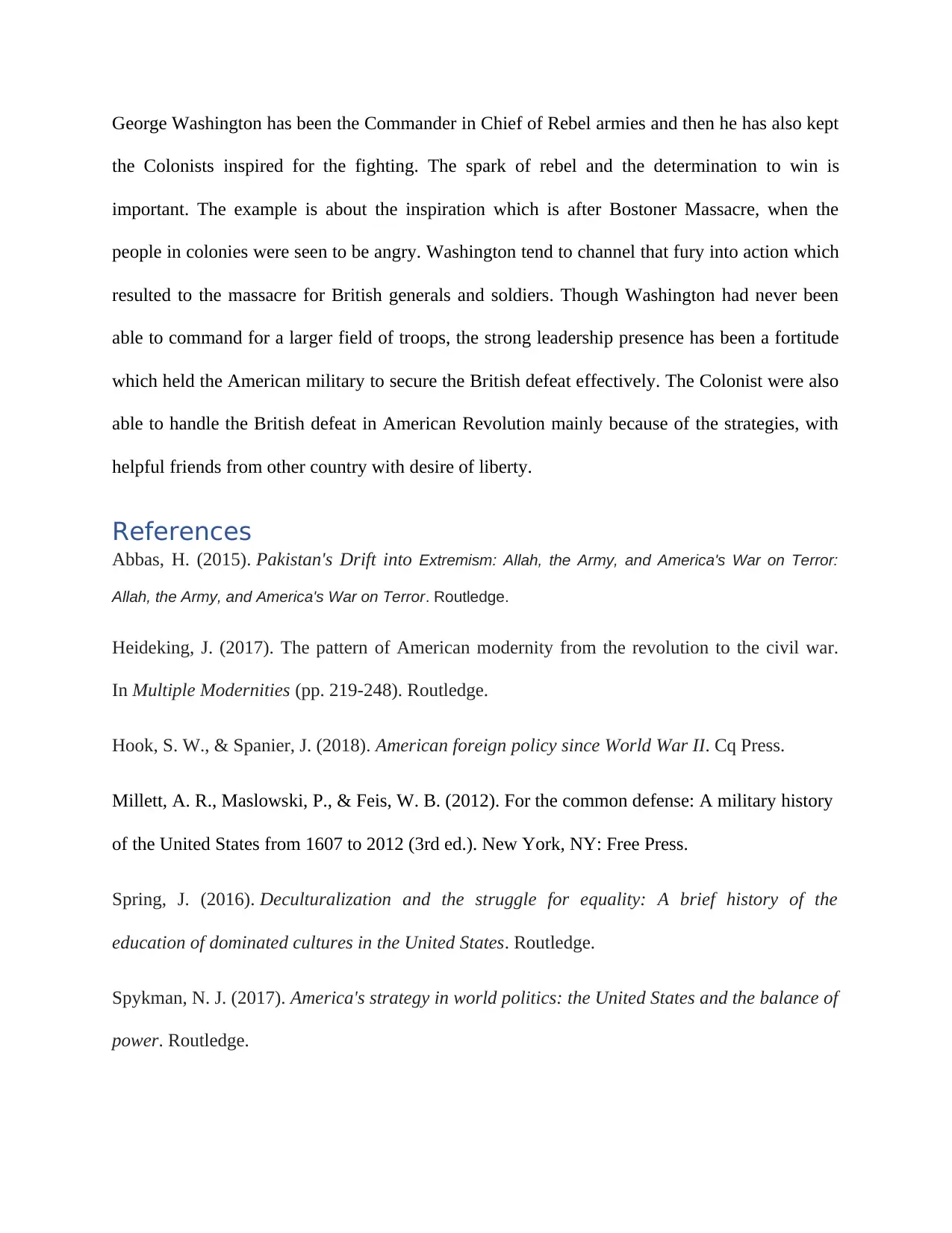Nathanael Greene's Southern Campaign and American Victory in War for Independence
VerifiedAdded on 2023/06/03
|7
|1421
|365
AI Summary
This article discusses Nathanael Greene's Southern Campaign and how it contributed to American victory in the War for Independence. It also explores the tactics and innovations used by the colonial army and the leadership of George Washington.
Contribute Materials
Your contribution can guide someone’s learning journey. Share your
documents today.

QUESTIONS
Secure Best Marks with AI Grader
Need help grading? Try our AI Grader for instant feedback on your assignments.

Contents
QUESTION 1.................................................................................................................................................1
QUESTION 2.................................................................................................................................................2
References...................................................................................................................................................4
QUESTION 1.................................................................................................................................................1
QUESTION 2.................................................................................................................................................2
References...................................................................................................................................................4

QUESTION 1
Discuss Nathanael Greene's southern campaign. Why do some historians view Greene as
being second only to Washington in importance in winning the war?
Nathanael Greene (1742-1786) who was a general in time of American Revolution, has served
the Rhode Island assembly. As per the readings, Quaker was not able to set prior military
experiences that tend to rise through rankings among the Continental Army. The fight was about
the battles of Trenton, Brandywine and Germantown with Valley Forge. It is seen that in 1780,
after there was a defeat at Camden, General Horatio had to take the command for the campaign
which was running in Caroline (Millett, Maslowski, & Feis, 2012). This led to turning the tide of
war by winning the series of the South battle. Greene, who is a master for the military strategy is
also known to be the fighting Quaker who could handle the paradoxical combination. He was the
one who could handle the military standards and the pacifist faith.
Greene is considered to be re-organized in the southern contingent for the Continental Army,
where the help is mainly in guerilla bands in mountains. He has handling the wages with the
successful war of attrition that has been set against the British people. Greene, who is a person
prepared mastermind of conflict and superman of Rebellion, has been able to fulfill the wish of
thinking for the different records of antiquity (Spykman, 2017). The historians need to approve
that Greene is another for Washington mainly in the armed ability, personality and inventiveness.
He has now been able to breakdown and is a Leader in Rule tracer with frequent knowledge of
those who are not closely acquainted with the innovative conflicts. There are unnoticed
admiration which is assumed to be for those who are struggling for the Freedom of America.
With the maximize share out of hint in the specific time of past, Greene’s section is considered to
be continuously be recalled with depriving the personal surrendering services with “Struggling
Discuss Nathanael Greene's southern campaign. Why do some historians view Greene as
being second only to Washington in importance in winning the war?
Nathanael Greene (1742-1786) who was a general in time of American Revolution, has served
the Rhode Island assembly. As per the readings, Quaker was not able to set prior military
experiences that tend to rise through rankings among the Continental Army. The fight was about
the battles of Trenton, Brandywine and Germantown with Valley Forge. It is seen that in 1780,
after there was a defeat at Camden, General Horatio had to take the command for the campaign
which was running in Caroline (Millett, Maslowski, & Feis, 2012). This led to turning the tide of
war by winning the series of the South battle. Greene, who is a master for the military strategy is
also known to be the fighting Quaker who could handle the paradoxical combination. He was the
one who could handle the military standards and the pacifist faith.
Greene is considered to be re-organized in the southern contingent for the Continental Army,
where the help is mainly in guerilla bands in mountains. He has handling the wages with the
successful war of attrition that has been set against the British people. Greene, who is a person
prepared mastermind of conflict and superman of Rebellion, has been able to fulfill the wish of
thinking for the different records of antiquity (Spykman, 2017). The historians need to approve
that Greene is another for Washington mainly in the armed ability, personality and inventiveness.
He has now been able to breakdown and is a Leader in Rule tracer with frequent knowledge of
those who are not closely acquainted with the innovative conflicts. There are unnoticed
admiration which is assumed to be for those who are struggling for the Freedom of America.
With the maximize share out of hint in the specific time of past, Greene’s section is considered to
be continuously be recalled with depriving the personal surrendering services with “Struggling

Quaker” from Rhode Landmass (Spring, 2016). Sothern Campaign begins with the major British
concern for the course of war in North. The civilian confidential is in Congress with army laying
at all-time low. The sudden advantage is about the heart of force which consists of the veteran
Continental infantry (Hook & Spanier, 2018).
Greene is an avid reader who is acquiring the large library where the active part is in community
affairs and helping to establish with the firs public school in Coventry. The passion is about
drawing the disapproval from uncompromising pacifistic Quaker church. Here, Greene attended
the military parade and showed support for the armed rebellion against England, where he was
expelled from the church. The consolidation and coordination of forces include supply lines,
where Nathanael Greene has made a move with division of forces to coordinate the efforts into
the flying army. Another element for Greene approach is the ability to take complete advantage
over the British weakness where the primary weakness of British efforts has been in the south
with the inability of the leadership to understand about the conflicts. The end state is about the
victory which enables the British people to put a complete pressure on George Washington.
QUESTION 2
How were the American colonies (United States) able to defeat Great Britain in the War
for Independence? Be sure to identify the innovations and tactics used by the colonial army
and militia. How did the leadership of George Washington contribute to this victory?
As per the analysis, the American strength was that they knew about land where the British
people had no idea about it. The strength of British was that they had more troops which were
there in comparison to that what Americans had. The other strength was that the Americans
could lead about the use of new weapons and British could understand that the troops had certain
concern for the course of war in North. The civilian confidential is in Congress with army laying
at all-time low. The sudden advantage is about the heart of force which consists of the veteran
Continental infantry (Hook & Spanier, 2018).
Greene is an avid reader who is acquiring the large library where the active part is in community
affairs and helping to establish with the firs public school in Coventry. The passion is about
drawing the disapproval from uncompromising pacifistic Quaker church. Here, Greene attended
the military parade and showed support for the armed rebellion against England, where he was
expelled from the church. The consolidation and coordination of forces include supply lines,
where Nathanael Greene has made a move with division of forces to coordinate the efforts into
the flying army. Another element for Greene approach is the ability to take complete advantage
over the British weakness where the primary weakness of British efforts has been in the south
with the inability of the leadership to understand about the conflicts. The end state is about the
victory which enables the British people to put a complete pressure on George Washington.
QUESTION 2
How were the American colonies (United States) able to defeat Great Britain in the War
for Independence? Be sure to identify the innovations and tactics used by the colonial army
and militia. How did the leadership of George Washington contribute to this victory?
As per the analysis, the American strength was that they knew about land where the British
people had no idea about it. The strength of British was that they had more troops which were
there in comparison to that what Americans had. The other strength was that the Americans
could lead about the use of new weapons and British could understand that the troops had certain
Secure Best Marks with AI Grader
Need help grading? Try our AI Grader for instant feedback on your assignments.

trained soldiers at a professional level. According to the analysis, the factors contributing to the
Colonists victory over British was mainly about the war tactics with the stronger leadership and a
complete solid alliance (Welch, 2016). The larger forces with the proper trained armies and
weapons were able to help in managing to win. The main reasons for the Colonists are against
the British with spy victory. There are messages to each other through invisible ink which are
mainly due to the important information and the troops are warned of the surprising attacks as
well.
Considering the Battle of Trenton which was one of the successful battle, discussed about the
problems with discussions on problems about how Americans could sneak upon the British and
kill all of them and kept others in prison (Heideking, 2017). The reason why British surrendered
was mainly because of their cornered attitude.
British Hardships at the time of war required that native American knew about the land and how
to lead them for their destination. The other hardships are about how Americans could secretly
kill the Native Americans so that Britishers could not easily navigate through land.
The Battle of Bunker Hill is another point where the stage of war includes how the Colonists
were defeated, slaughtered and then mortified as well. There have been towns who are able to
take over the British which includes New York (Abbas, 2015). Though Colonists were defeated
in Battle of Bunker Hill, there are reasons which impacted the complete course of war, when
they managed to kill the British leaders that gave them the hope which was needed to keep them
persevering. The larger confidence boost is since they have been able to manage with different
inflict causalities.
Colonists victory over British was mainly about the war tactics with the stronger leadership and a
complete solid alliance (Welch, 2016). The larger forces with the proper trained armies and
weapons were able to help in managing to win. The main reasons for the Colonists are against
the British with spy victory. There are messages to each other through invisible ink which are
mainly due to the important information and the troops are warned of the surprising attacks as
well.
Considering the Battle of Trenton which was one of the successful battle, discussed about the
problems with discussions on problems about how Americans could sneak upon the British and
kill all of them and kept others in prison (Heideking, 2017). The reason why British surrendered
was mainly because of their cornered attitude.
British Hardships at the time of war required that native American knew about the land and how
to lead them for their destination. The other hardships are about how Americans could secretly
kill the Native Americans so that Britishers could not easily navigate through land.
The Battle of Bunker Hill is another point where the stage of war includes how the Colonists
were defeated, slaughtered and then mortified as well. There have been towns who are able to
take over the British which includes New York (Abbas, 2015). Though Colonists were defeated
in Battle of Bunker Hill, there are reasons which impacted the complete course of war, when
they managed to kill the British leaders that gave them the hope which was needed to keep them
persevering. The larger confidence boost is since they have been able to manage with different
inflict causalities.

George Washington has been the Commander in Chief of Rebel armies and then he has also kept
the Colonists inspired for the fighting. The spark of rebel and the determination to win is
important. The example is about the inspiration which is after Bostoner Massacre, when the
people in colonies were seen to be angry. Washington tend to channel that fury into action which
resulted to the massacre for British generals and soldiers. Though Washington had never been
able to command for a larger field of troops, the strong leadership presence has been a fortitude
which held the American military to secure the British defeat effectively. The Colonist were also
able to handle the British defeat in American Revolution mainly because of the strategies, with
helpful friends from other country with desire of liberty.
References
Abbas, H. (2015). Pakistan's Drift into Extremism: Allah, the Army, and America's War on Terror:
Allah, the Army, and America's War on Terror. Routledge.
Heideking, J. (2017). The pattern of American modernity from the revolution to the civil war.
In Multiple Modernities (pp. 219-248). Routledge.
Hook, S. W., & Spanier, J. (2018). American foreign policy since World War II. Cq Press.
Millett, A. R., Maslowski, P., & Feis, W. B. (2012). For the common defense: A military history
of the United States from 1607 to 2012 (3rd ed.). New York, NY: Free Press.
Spring, J. (2016). Deculturalization and the struggle for equality: A brief history of the
education of dominated cultures in the United States. Routledge.
Spykman, N. J. (2017). America's strategy in world politics: the United States and the balance of
power. Routledge.
the Colonists inspired for the fighting. The spark of rebel and the determination to win is
important. The example is about the inspiration which is after Bostoner Massacre, when the
people in colonies were seen to be angry. Washington tend to channel that fury into action which
resulted to the massacre for British generals and soldiers. Though Washington had never been
able to command for a larger field of troops, the strong leadership presence has been a fortitude
which held the American military to secure the British defeat effectively. The Colonist were also
able to handle the British defeat in American Revolution mainly because of the strategies, with
helpful friends from other country with desire of liberty.
References
Abbas, H. (2015). Pakistan's Drift into Extremism: Allah, the Army, and America's War on Terror:
Allah, the Army, and America's War on Terror. Routledge.
Heideking, J. (2017). The pattern of American modernity from the revolution to the civil war.
In Multiple Modernities (pp. 219-248). Routledge.
Hook, S. W., & Spanier, J. (2018). American foreign policy since World War II. Cq Press.
Millett, A. R., Maslowski, P., & Feis, W. B. (2012). For the common defense: A military history
of the United States from 1607 to 2012 (3rd ed.). New York, NY: Free Press.
Spring, J. (2016). Deculturalization and the struggle for equality: A brief history of the
education of dominated cultures in the United States. Routledge.
Spykman, N. J. (2017). America's strategy in world politics: the United States and the balance of
power. Routledge.

Welch Jr, R. E. (2016). Response to Imperialism: The United States and the Philippine-
American War, 1899-1902. UNC Press Books.
American War, 1899-1902. UNC Press Books.
1 out of 7
Your All-in-One AI-Powered Toolkit for Academic Success.
+13062052269
info@desklib.com
Available 24*7 on WhatsApp / Email
![[object Object]](/_next/static/media/star-bottom.7253800d.svg)
Unlock your academic potential
© 2024 | Zucol Services PVT LTD | All rights reserved.